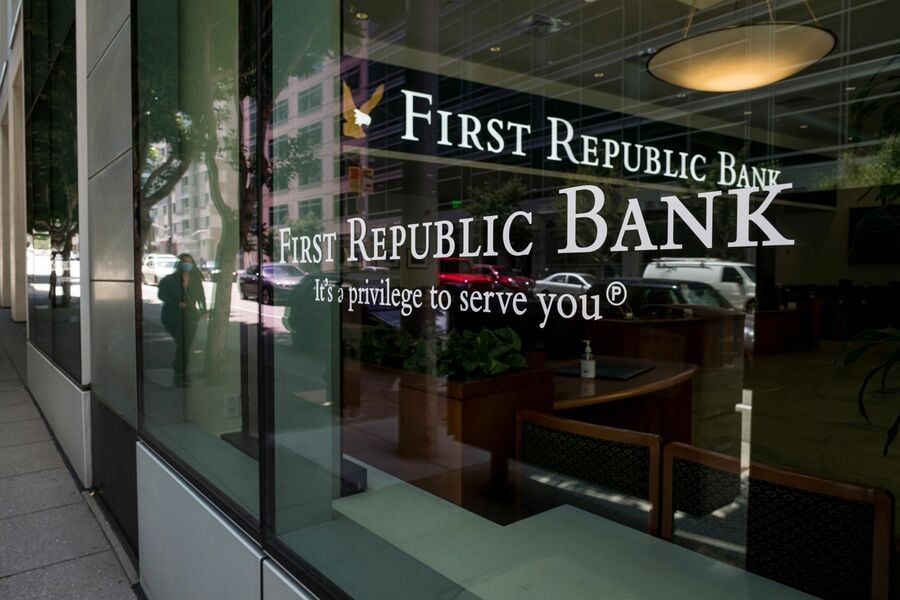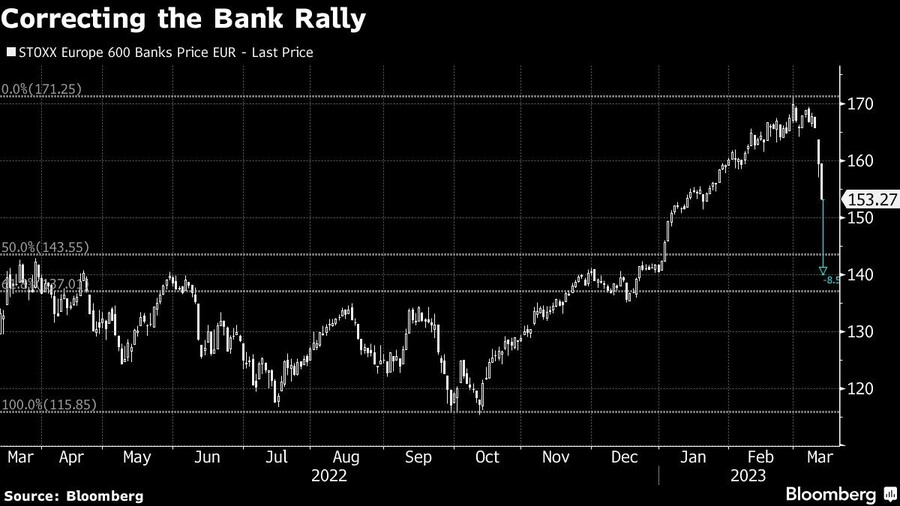

Turmoil continued to engulf shares in banks as investors rushed to reduce exposure to the banking industry after seeing equity stakes wiped out at Silicon Valley Bank and Signature Bank.
The collapse of SVB Financial Group’s Silicon Valley Bank Friday and Signature’s seizure by regulators over the weekend sent tremors through the broader banking system. Regional lenders plunged to start the week, with the KBW Regional Banking Index sinking by as much as 12%, its sharpest intraday plunge since March 2020.
• First Republic Bank sank 67% for a record drop.
• Western Alliance Bancorp lost 76%, its biggest drop ever>
• PacWest Bancorp was down 41%, hitting a record low
“The market is likely to remain very cautious despite regulators stepping in,” said Marija Veitmane, senior multi-asset strategist at State Street Global Markets. “This is a difficult position Fed is in, on the one hand it needs to keep hiking to arrest inflation, but also it needs to protect the financial system. Feels like a lose-lose situation for the Fed and the market.”
Many large U.S. banks are also churning lower, with JPMorgan Chase & Co., Bank of America Corp. and Wells Fargo & Co. all trading down to start the week.
Equity investors so far have found little reason to stick around to find out if the customer exodus putting some regional banks under existential pressure would ease. Treasury two-year yields sank as demand for haven assets soared.
“There will be a search for the next victim and the recession probability is set to increase over the next weeks,” said Alberto Tocchio, a portfolio manager at Kairos Partners.
While flows for several of the bank ETFs arrive with a delay, there were signs that investors had started to ditch holdings late last week. The $1.7 billion Invesco KBW Bank ETF (KBWB) posted an outflow of $245 million in the latest data, the largest exit in a year.
The unwind is especially brutal because investors had piled into banks on the assumption they would benefit from the aggressive tightening by the Federal Reserve that sent interest rates up to 4.5% from zero in just under a year. But while higher rates are often thought to buttress interest income, the issue is complicated in 2023 by a steeply inverted yield curve that depresses yields on longer-dated assets versus short-term liabilities.
Retaining deposits is hard when money market rates are as much as 50% higher than interest paid on savings accounts. And if deposits flee, banks may be forced to book what had only been paper losses on mortgage bond and Treasury holdings they are forced to sell.
The buckling shares highlighted that even after emergency measures by US regulators, including a new backstop for banks, investors remained on edge that more seizures were possible. Broadly, the government actions bolstered markets, though overnight gains wobbled as investors poured into fixed income investments. The latest crisis poses a risk to the strong rally seen in US and European shares since October.
“After the liability-driven investment fund crisis in autumn 2022, we see this is another episode where parts of the financial system are hit by the unwinding of accommodative central bank policy,” said Deutsche Bank analyst Benjamin Goy.

While U.S. regulators introduced a new backstop for banks that Federal Reserve officials said was big enough to protect the nation’s deposits, the surprise announcement that New York’s Signature Bank was being shuttered reminded investors that further turmoil, at least among regional banks, was still possible. A senior Treasury official said some institutions had issues similar to the failed Silicon Valley Bank.
“We’re seeing a liquidity withdrawal, the classic thing that you’d expect following a credit event like what’s happening at SVB,” said Haig Bathgate at Atomos Investments. “People get scared, reduce exposure to equities and move into government bonds. They’re wondering if anyone else will be in this position as these things don’t tend to happen in isolation.”
Government intervention managed to avert deposit losses, but deposit migration to large banks may keep the pressure on some lenders, Wells Fargo strategists including Christopher Harvey said in a note. Harvey said he wouldn’t buy risk now and sees Tuesday CPI print as a wild card.
U.S. stocks tumbled at the end of last week when Silicon Valley Bank suddenly collapsed in the biggest such incident since the global financial crisis. The Fed’s aggressive tightening campaign has sent interest rates surging, leaving some banks holding long-dated bonds that have plunged in value at the same time their financing costs are surging.
“I don’t think the system as a whole is inherently financially unstable, certainly systemic risk has been considered low,” Susannah Streeter, head of money and markets at Hargreaves Lansdown, said in a Bloomberg TV interview. “But what I think you’re seeing is this risk-averse nature really sweeping through and renewed worries just about higher interest rates being elevated for longer and the repercussions of that.”
“I actually think that what happened this morning is that investors have woken up to the fact that a very serious situation has been averted and I think the seriousness was just underestimated actually,” Streeter added.
As a result of the latest turmoil, Goldman Sachs Group Inc. economists said they no longer expect the Fed to deliver a rate increase next week.

A new proposal could end the ban on promoting client reviews in states like California and Connecticut, giving state-registered advisors a level playing field with their SEC-registered peers.

Morningstar research data show improved retirement trajectories for self-directors and allocators placed in managed accounts.

Some in the industry say that more UBS financial advisors this year will be heading for the exits.

The Wall Street giant has blasted data middlemen as digital freeloaders, but tech firms and consumer advocates are pushing back.

Research reveals a 4% year-on-year increase in expenses that one in five Americans, including one-quarter of Gen Xers, say they have not planned for.
Orion's Tom Wilson on delivering coordinated, high-touch service in a world where returns alone no longer set you apart.
Barely a decade old, registered index-linked annuities have quickly surged in popularity, thanks to their unique blend of protection and growth potential—an appealing option for investors looking to chart a steadier course through today's choppy market waters, says Myles Lambert, Brighthouse Financial.
